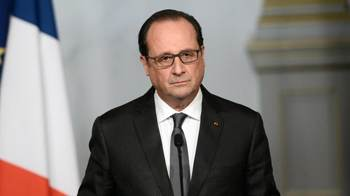President Francois Hollande told the authors of a book just published that France has “a problem with Islam” and there are too many immigrants arriving in the country who “shouldn’t be here”.
Hollande made the controversial remarks to the authors of A President Shouldn’t Say That… in December 2015, a month after gunmen attacked Paris, killing 130 people. ISIS claimed responsibility for the deadly assault.
“It’s true that there’s a problem with Islam. No one doubts it,” Hollande is quoted as saying in the book published this week.
“It’s not that Islam poses a problem in the sense that it is a dangerous religion, but in as far as it wants to affirm itself as a religion of the Republic.”
Hollande also told the Le Monde journalists Gerard David and Fabrice Lhomme: “I think there are too many arrivals of immigration that shouldn’t be there.”
Immigration and national identity are key themes in campaigning for next year’s presidential election.
A string of attacks in France in the past two years, coupled with the Europe-wide migrant crisis, have stoked anti-immigration sentiment.
A heated debate about Muslim integration in staunchly secular France came to a head over the summer when about 30 towns banned the body-concealing “burkini” swimsuit. France’s highest administrative court later ruled that such a ban was a “serious” violation of basic freedoms.
The deeply unpopular Hollande has not yet declared whether he intends to stand for re-election.
But his arch-rival Nicolas Sarkozy, bidding for the centre-right nomination, is campaigning heavily on populist anti-immigration themes.
“Politicians from across the spectrum have almost a free rein to criticise/demonise Islam and Muslims and use it as a scare tactic whenever a particular leader or political party is in a critical situation facing the public opinion – knowing that the French Muslim citizens have no real organised lobby with the capacity to exercise any influence on the parties or politicians,” French sociologist and media critic Ali Saad told Al Jazeera.
“This reality is even clearer in the case of the present government, since all the Socialist Party’s tenors – such as [Prime Minister] Valls, [former finance minister] Macron, [and women’s rights Minister Laurence] Rossignol – are on the same wavelength as the president,” he added.
The anti-Islamophobia campaign groups accuse the French government and political class of being responsible for igniting anti-Muslim sentiment.
On immigration, the French leader told the authors: “I think there are too many arrivals, immigrants who shouldn’t be there … we teach them to speak French and then another group arrives and we have to start all over again. It never stops … so, at some point it has to stop.”
Refugees fleeing war and persecution in conflict zones in the Middle East and North Africa have been flowing into the European continent over the past several years. Many blame the West for the militancy and violence that has displaced millions of people in the Middle East, mainly Syrians, causing the huge refugee influx into Europe.
France, along with other Western countries, supports militant groups fighting to topple the government of Syrian President Bashar al-Assad in Syria.
Many hardened militants hail from France itself, raising fears they might hit back at the heart of Europe when they return home.
On the issue of the veil, the French president also suggested that today’s “veiled woman” could become a Marianne, the female symbol of the French republic.
“If we can offer her the right conditions for her to flourish, she will remove the veil and become French, all while remaining religious if she wants to,” the French president noted.
The remarks follow tensions in France over a controversial ban on Muslim women’s full-body swimwear, known as burkini.
Mayors in about 30 French coastal resorts banned burkini this summer, but France’s highest court ruled this week that the ban is “seriously and clearly illegal.”
Despite the ruling, as many as 28 French mayors still defiantly uphold the ban while right-wing politicians have pledged to pass legislation at a central government level to maintain the law.
Anti-refugee posters spark outrage
Meanwhile, a notorious French mayor has sparked outrage among rights groups after putting up anti-refugee posters warning that “they’re coming” to his southern town of Beziers
“The state is imposing them on us,” the poster reads. “Migrants in our town center.”
 Mouood Mouood English Edition
Mouood Mouood English Edition




